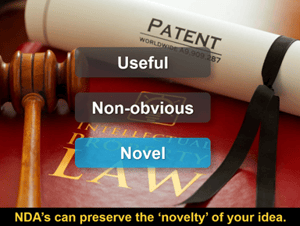1. Should you sign an NDA for a Discovery interview?
You don't need--or even want--an NDA. But your customer may.
In many industries, it’s common practice to cover supplier-customer discussions under a non-disclosure agreement (NDA). And this is especially true if technical people are meeting from each side. This is done to protect intellectual property in situations such as these:
 A clever technical idea arises from the discussion. Later, without good documentation, conflict could arise as the supplier and customer try to sort out who “owns” this idea.
A clever technical idea arises from the discussion. Later, without good documentation, conflict could arise as the supplier and customer try to sort out who “owns” this idea.- For an idea to patentable, it must be useful, non-obvious and novel (new to the world.) If the supplier’s idea is discussed without an NDA, the idea becomes part of the public domain, and is therefore no longer “novel” and patentable.
But if you are conducting a Discovery interview, do you need an NDA to protect yourself? No, because you’re going to stay strictly in “outcome space,” not “solution space.” Even if the customer offers a solution, you’ll ask, “What would that do for you?”... to quickly move back into outcome space.
So your preference should be to conduct the Discovery interview without an NDA... to avoid slowing the process down engaging lawyers, getting approvals, etc. But what if your customer wants an NDA? We'll cover ways to handle this in the next BlueHelp article, How to handle customer requests for an NDA.
Keywords: NDA, non-disclosure agreement, CDA, confidential disclosure agreement, lawyer, legal, patent, novel, outcome space, solution space, secret information, confidential information